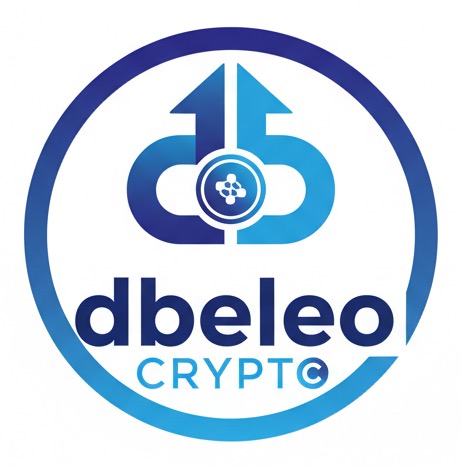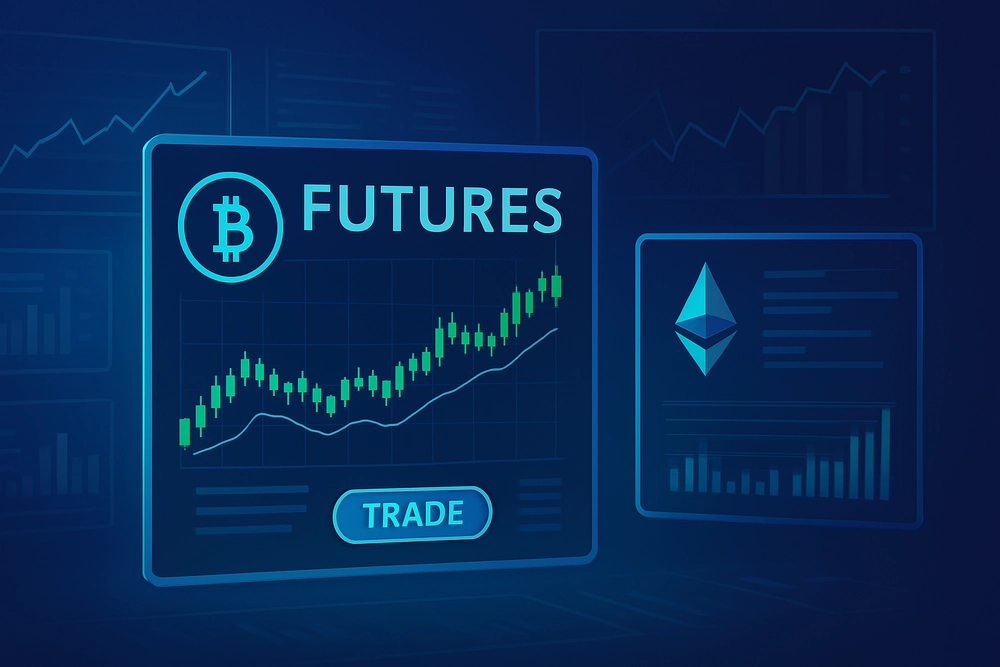The U.S. cryptocurrency market offers only a few regulated venues for futures trading. Due to strict CFTC/NFA oversight, Americans can trade crypto futures mainly on approved platforms like Coinbase Financial Markets and Kraken’s U.S. Derivatives (via CME contracts). Offshore exchanges (Bybit, Deribit, Binance.com, etc.) are generally not accessible to U.S. residents.
All U.S. futures trading must occur on Commodity Futures Trading Commission (CFTC) registered markets or through CFTC-licensed brokers.
Below we review the top crypto futures platforms for U.S. traders, highlighting leverage, fees, trading pairs, KYC, and compliance.
Also read: Navigating Crypto Liquidity: Assessing Liquidity Aggregators and Provider Exchanges
CFTC-Regulated Crypto Futures in the U.S.
Crypto futures in the U.S. are treated as commodities. Any futures product (standard futures, micro futures, or new perpetual-style futures) must trade on a registered exchange (Designated Contract Market) under CFTC rules. Major regulated venues include:
- CME Group: Offers cash-settled Bitcoin and Ether futures (and micro futures) on the CME Globex electronic platform. U.S. brokers like Interactive Brokers or tastytrade let retail traders access these CME contracts.
- ICE/Bakkt: Intercontinental Exchange’s Bakkt Bitcoin futures (physically-delivered contracts), but these have low volume and are listed as Bakkt-branded contracts.
- Coinbase Financial Markets (CFM): The first CFTC-regulated crypto futures exchange built for retail U.S. traders. CFM (a Coinbase subsidiary) offers federally compliant futures contracts sized for retail (nano Bitcoin/Ether).
- Kraken Derivatives US: Kraken partners with NinjaTrader Clearing to provide CFTC-regulated futures trading of CME bitcoin and ether futures. Kraken Derivatives US (an FCM) is registered with the CFTC and NFA, allowing American customers to trade standard CME crypto futures through Kraken’s interface.
- Specialty U.S. Brokers: Futures brokers like tastytrade also give retail access to CME’s standard and micro Bitcoin futures. (These are not crypto exchanges per se, but regulated futures brokers.)
(All U.S. crypto futures venues require full KYC and operate under U.S. compliance – no anonymous or offshore trading allowed.)
Top U.S.-Legal Crypto Futures Platforms
Coinbase Financial Markets (CFM) – U.S. Futures Exchange
- Overview: Coinbase Financial Markets, Inc. (CFM) is a CFTC-licensed futures exchange created by Coinbase for U.S. traders. It offers regulated, margined futures and perpetual-style futures on major crypto assets. In 2023, CFM launched nano-sized Bitcoin and Ether futures (1/100 BTC, 1/10 ETH) for retail traders. In July 2025, Coinbase added CFTC-compliant perpetual futures (no expiration dates) on Bitcoin and Ether, with up to 10x intraday leverage.
- Leverage: Up to 10× leverage on perpetual futures (long-dated futures). Standard futures leverage is similar to CME margins (~2–5×).
- Fees: Very low: trading fees as low as 0.02% per contract (inclusive of exchange, clearing, NFA fees). Coinbase charges a flat $0.15 per contract to cover fixed costs, making it affordable for small trades.
- Supported Contracts: Nano Bitcoin (BTC-PERP), Nano Ether (ETH-PERP), and USD-settled quarterly futures on Bitcoin and Ethereum. Coinbase has announced futures for altcoins like Avalanche, Chainlink, Polkadot, Stellar, and Shiba Inu. All contracts settle in USD.
- KYC/Compliance: Coinbase CFM requires full U.S. identity verification and address. It is regulated as a futures exchange, upholding strict CFTC standards. Traders must already have a Coinbase account and apply to CFM for access.
- Safety: As a CFTC-registered venue with regulated clearing, CFM offers a high level of safety and transparency. Funds and positions are held with a licensed futures commission merchant.
Kraken Derivatives US (via CME Futures)
- Overview: Kraken Derivatives US is a U.S.-only platform (powered by NinjaTrader Clearing) that lets Americans trade CME Group’s crypto futures. It does not offer any unregulated perpetuals – only CME’s established Bitcoin and Ether futures (and micro futures). Kraken US futures is CFTC-compliant and the clearing is handled by an NFA-registered FCM.
- Leverage: Leverage is set by CME margin requirements. Currently, CME Bitcoin futures require ~50% margin (≈2× leverage), though flexible margin offset programs exist. (Practically, retail brokers often require around 2–5× margin on crypto futures.)
- Fees: 0.00005 of notional (0.5 basis points) commission per side – extremely low (about $0.30 round-trip on 0.1 BTC). In addition, traders pay fixed clearing and NFA fees (around $0.15 per contract on Kraken’s platform). Overall costs are tiny compared to most spot or leveraged crypto exchanges.
- Supported Contracts: Bitcoin (BTC) futures and Ether (ETH) futures, including micro futures (0.1 BTC size) and weekly, monthly contracts. (Kraken Derivatives US uses CME’s contract codes.) No altcoins or perpetual swaps are offered.
- KYC/Compliance: All U.S. regulations apply. Kraken’s U.S. futures unit is a CFTC-registered Derivatives Clearing Organization, and traders must complete Kraken’s standard pro-level KYC. Only U.S. residents can open Kraken US futures accounts.
- Safety: Trading on CME means an institutional-grade clearinghouse backs all trades. Kraken Derivatives US is an NFA member (FCM #0309379). The high regulatory bar (CFTC/NFA) and use of CME’s highly liquid markets make this one of the safest ways to trade crypto futures.
CME Group (via Futures Brokers)
- Overview: The Chicago Mercantile Exchange (CME) is the largest regulated crypto derivatives venue. It lists cash-settled Bitcoin and Ether futures (full-size and micro contracts). U.S. retail traders access these contracts through brokers (IBKR, tastytrade, TD Ameritrade, etc.).
- Leverage: Roughly 2× (Bitcoin futures require ~50% margin). Some brokers may allow up to ~5× if offering portfolio margin. Unlike offshore 100× products, CME enforces high margin for stability.
- Fees: Broker fees vary, but futures commission is typically $0.75–$1.00 per contract each way. For example, tastytrade charges $1.00 per contract on standard Bitcoin futures and $0.75 on micro futures. CME’s own exchange fee (~$1.16) and NFA fee (~$0.09) also apply, usually built into the broker’s commission.
- Supported Contracts: Bitcoin (BTC) futures (25 BTC standard size) and micro Bitcoin (0.1 BTC), plus Ether (ETH) futures (50 ETH) and micro Ether (5 ETH) contracts. CME also has Bitcoin and Ether options. No altcoins, and no perpetuals (all are expiring futures).
- KYC/Compliance: All U.S. futures brokers require full ID verification and U.S. residency. Since CME futures are highly regulated, traders face strict rules and margin requirements.
- Safety: Very high – CME Group is a top-tier regulated exchange. Trades clear through CME Clearing with posted collateral. This is the same infrastructure trusted by major banks and hedge funds to manage crypto risk safely.
Tastytrade (Futures Broker)
- Overview: Tastytrade is a retail trading platform (formerly Tastyworks) that offers CME Bitcoin futures and micro-futures. It’s not a crypto exchange, but a U.S.-licensed futures broker that lets individuals trade crypto futures.
- Leverage: Same as CME margins (~2×). No additional crypto leverage beyond what CME requires.
- Fees: Very low flat fees: $1.00 per standard BTC futures contract and $0.75 per micro futures (each side). No ticket charges; closing a position is free beyond that contract fee.
- Supported Contracts: CME Bitcoin Futures (1 contract = 5 BTC) and CME Bitcoin Micro Futures (1 contract = 0.1 BTC). (Tastytrade does not offer Ether futures.)
- KYC/Compliance: Must complete futures account verification (suitability check, ID/KYC) to trade on Tastytrade. Only U.S. residents can use Tastytrade.
- Safety: Trades execute on CME and clear in U.S. regulated markets. Tastytrade is an FCM (through Dorman Trading) and an NFA member. Customer funds and positions are protected by U.S. futures regulations.
Comparison of Key Features
| Platform | Leverage | Fees | Crypto Pairs (Futures) | KYC Required | Regulated |
|---|---|---|---|---|---|
| Coinbase CFM/Derivatives | Up to 10× (perps)<br>~2–5× (quarterlies) | ~0.02% per contract (~$0.15 min) | BTC, ETH (nano futures), plus altcoin futures (AVAX, LINK, DOT, XLM, SHIB) | Yes (Full U.S. KYC) | CFTC-registered futures exchange |
| Kraken Derivatives US | ~2× (CME margin) | 0.00005 × notional per side (≈$0.60 round-trip for 0.1 BTC) | BTC, ETH futures (CME standard & micro) | Yes (Kraken Pro KYC) | FCM/NFA (CFTC) for CME futures |
| CME Group (via IBKR, Tastytrade) | ~2× (CME margin) | $0.75–$1.00 per contract per side | BTC, ETH (standard and micro) | Yes (Broker KYC) | CFTC-registered exchange (CME) |
| Tastytrade (broker) | ~2× | $1.00 (BTC) / $0.75 (Micro-BTC) per contract | BTC, Micro-BTC | Yes (Tastytrade KYC) | FCM (CME) / NFA member |
(Fees shown exclude CME’s small exchange and NFA fees which are added per trade.)
Also read: Everything You Should Know About Betting Exchanges
U.S. Crypto Futures Leverage and Fees
- Leverage Limits: U.S. crypto futures leverage is much lower than offshore platforms. Regulated exchanges enforce high margin. For example, Coinbase’s new perpetuals offer up to 10× intraday leverage. By contrast, CME bitcoin futures require ~50% margin (≈2× leverage). (Actual leverage depends on each broker’s margin policy.)
- Fees: Overall, U.S. futures fees are minimal. Coinbase CFM charges as little as 0.02% per contract. Kraken Derivatives US takes 0.5 basis points (0.00005) of the notional per side. Tastytrade charges a flat $1.00 (standard BTC) or $0.75 (micro BTC) per contract. These are generally lower than spot trading fees.
- Contract Specs: A standard CME bitcoin futures contract is 5 BTC; a micro is 0.1 BTC. Coinbase’s futures are often “nano” size (1/100 BTC). Fees and margin scale accordingly.
Supported Crypto Assets
- Bitcoin & Ether: All U.S. futures platforms support Bitcoin futures. Ether futures are also available on CME/Coinbase. These two are the “must-have” contracts for U.S. traders.
- Altcoins: Coinbase CFM has led in adding regulated altcoin futures (Avalanche, Chainlink, Polkadot, Stellar, Shiba Inu). Kraken (CME) and Tastytrade stick to BTC/ETH only.
- No Perpetual Swaps Offshore: Traditional perpetual futures (as on Binance.com or Bybit) have no U.S. legal equivalent until Coinbase CFM’s new offering. Note: Coinbase’s “perpetual-style” futures still settle as futures with 5-year expirations – they mimic perpetual swaps under CFTC rules.
Also read: Understanding Decentralized Exchanges (DEX) in the Crypto World
KYC, Regulation and Safety
All U.S. platforms require full KYC and proof of U.S. residency. Anonymous trading is not allowed. Since crypto futures trading is overseen by the CFTC, exchanges or brokers must register as Designated Contract Markets or FCMs. For example, Kraken US futures is offered through NinjaTrader Clearing (an NFA-registered FCM), and Coinbase CFM is a licensed futures exchange. This means customer funds are held in segregated accounts, margin requirements are enforced, and regulators can inspect the systems.
Regulated platforms also enforce strong consumer protections and financial safeguards (e.g. audited proof-of-reserves, mandatory clearing). As the CFTC and SEC note, U.S. investors have the freedom to choose regulated exchanges to trade crypto derivatives. This stands in contrast to unregulated offshore “margined exchanges” where U.S. access is illegal and uninsured.
Answering Common Questions (FAQ)
- Which crypto futures exchanges can U.S. traders use?
U.S. residents must use CFTC-registered venues or approved futures brokers. Top options include Coinbase Financial Markets (derivatives arm of Coinbase) and Kraken Derivatives US (via CME). Retail futures brokers like tastytrade or Interactive Brokers also provide access to CME bitcoin/ether futures. Offshore exchanges (Bybit, Deribit, Binance.com) do not legally serve U.S. traders. - How is leverage limited for U.S. crypto futures?
Unlike some overseas platforms offering 100× leverage, U.S. futures impose strict margin. For example, Coinbase’s CFTC-regulated contracts offer up to 10× intraday leverage on their perpetual futures. CME bitcoin futures typically require ~50% margin (≈2× leverage). Traders should check each platform’s margin rules – you won’t get 100× on a U.S. exchange. - What fees will I pay?
Fees on regulated futures are very low. Coinbase CFM charges around 0.02% per contract (about $0.15 minimum). Kraken US futures charges 0.5 basis points of the trade value per side. U.S. futures brokers (like tastytrade) charge flat fees (e.g. $1.00 per standard Bitcoin futures contract). Always include small exchange/NFA fees (usually $0.10–$0.20 per contract) on top of commissions. - What crypto pairs are available?
Bitcoin (BTC) futures are universal. Ether (ETH) futures are available on CME/Kraken/Coinbase. Coinbase is expanding into altcoins: contracts for AVAX, LINK, DOT, XLM, SHIB are or will be offered. No U.S. platform currently offers futures on small-cap tokens or tokens only listed offshore. - Is trading crypto futures safe/legal?
Yes – if done on a regulated platform. U.S. futures are traded through entities regulated by the CFTC and NFA, meaning they meet federal standards for fairness and capital. Exchanges like CME, Kraken US, and Coinbase CFM use robust clearinghouses and U.S. banking. By contrast, trading on unregulated overseas exchanges violates U.S. law and carries fraud risk. - What KYC/identity checks are needed?
All U.S. futures trading platforms require full identity verification. Expect to provide government ID, proof of address, and complete a suitability questionnaire. For example, Coinbase CFM requires you to sign up for a regular Coinbase account and then apply for Futures trading. There is no way to trade anonymously or without KYC in the U.S. markets. - Can I trade crypto futures 24/7 in the U.S.?
Most U.S. crypto futures (via CME) have trading hours similar to other CME products: essentially 23 hours/day on weekdays with short maintenance breaks. Coinbase’s perpetual futures, however, operate 24/7 like their offshore counterparts. Note that Coinbase’s perpetuals settle only twice per day (unlike continuous funding swaps abroad), which is how they comply with U.S. rules. - How do I start trading U.S. crypto futures?
You’ll need a fully verified account on a supported platform. For Coinbase, open a Coinbase Advanced account, then apply for Coinbase Financial Markets trading. On Kraken, upgrade to Pro verification and check eligibility for U.S. futures. With brokers like tastytrade or IBKR, simply apply for a futures account under their standard process. - Why can’t I use Binance/Bybit or trade perpetuals easily?
Those platforms are offshore and not licensed for U.S. customers. The U.S. does not allow Americans to trade on foreign exchanges that aren’t CFTC-regulated. Until recently, U.S. traders could only access shorter-dated futures, but now Coinbase CFM offers regulated long-dated/perpetual-style futurer. The key is using a domestic, registered exchange. - Are U.S. crypto futures taxed differently?
Futures contracts are taxed under Section 1256 of the U.S. tax code (60% long-term, 40% short-term capital gains). This can be more favorable than spot crypto taxation, but tax laws change often – consult a tax professional for details.
By focusing on fully licensed, U.S.-friendly platforms, this guide helps American traders navigate the limited but growing landscape of crypto futures. Always ensure any futures exchange or broker you use is registered with the CFTC/NFA. The information above provides a foundation to choose a safe, compliant futures venue and understand its trading terms.







